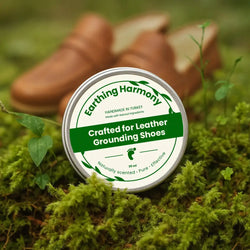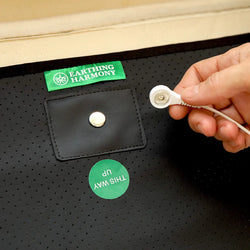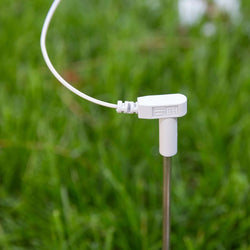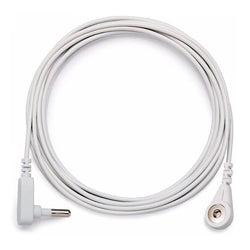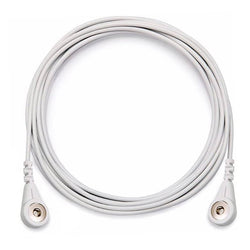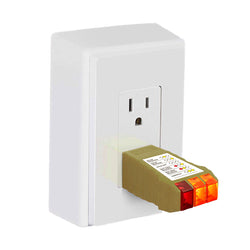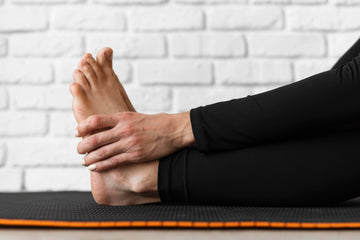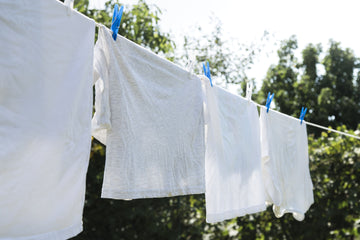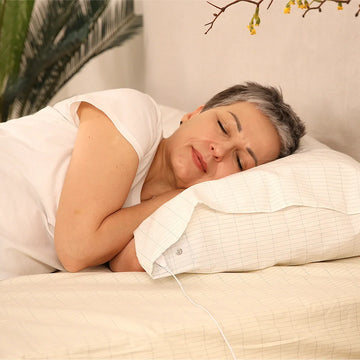Reconnecting with the Earth, Even in the Cold

When snow blankets the ground and icy winds bite at your skin, walking barefoot in the grass might feel like a far-off memory. For many, winter creates a sense of disconnection from the world—from nature, from movement, even from ourselves. But what if the cold didn’t have to cut us off from the Earth’s healing energy?
Grounding, or earthing, is the practice of physically connecting your body to the earth’s surface to absorb its natural electrical charge. While this might sound like a warm-weather activity, winter grounding is not only possible—it may actually be essential.
During the colder months, we face higher levels of stress, weaker immunity, and winter blues, including Seasonal Affective Disorder (SAD). Grounding offers a natural way to reduce stress, boost well-being, and support our bodies through winter’s challenges.
In this guide, we’ll explore how to manage to ground yourself in winter with powerful indoor and outdoor grounding techniques, explain why grounding matters in cold weather, and highlight tools like grounding mats and grounding sheets that make it easy to remain connected all year long.
Let’s dive into the science, practices, and products that can help you thrive this winter—no matter how chilly it gets!
Why Grounding Is Important in Winter Months
Seasonal Disconnection: A Health Risk We Don’t Talk About
Modern life already pulls us away from the Earth’s surface. But in winter, this disconnection deepens. Most people spend their time indoors, bundled in insulating clothing, surrounded by electronics and artificial light.
This seasonal shift can for example throw off the nervous system, elevate stress, and disturb our circadian rhythm—the internal clock that governs our sleep-wake cycle.
According to studies, reduced exposure to natural light and earth contact can suppress melatonin production, making it harder to fall asleep and weakening immune responses. This is why SAD and low mood are common in winter.

Earthing, even for a few moments a day, helps restore this balance by calming the nervous system and supporting healthy melatonin levels.
Scientific Benefits of Grounding in Cold Months
The health benefits of earthing don’t take a break when the weather turns cold. In fact, grounding energy may be even more impactful during this time. Studies show grounding can:
-
Support improved sleep by helping the body recalibrate its circadian rhythm.
-
Reduce inflammation, which is often higher during winter months due to immune challenges.
-
Promote blood flow, easing muscle tension and improving recovery.
-
Calm the nervous system, reducing anxiety and emotional stress.
Free electrons from the Earth help neutralize oxidative stress in our body, acting like natural antioxidants. This can be a powerful tool for maintaining well-being during winter, when our bodies are more vulnerable.
👉 Explore more on the connection between grounding and better rest in our article Grounding for Better Sleep: The Natural Way to restful Nights.
Is Grounding Possible in Winter? Yes — Here’s How
Debunking the Myth: Cold Doesn’t Block Earth’s Energy
Contrary to popular belief, snow doesn’t completely block the energy of the Earth. While dry snow is less conductive than wet grass, frozen ground and moist surfaces can still carry our planets electrical current. Even a brief contact with bare feet on snow or touching a tree trunk with bare hands can deliver a measurable grounding effect.
The Earth’s field is active year-round—it doesn’t stop pulsing life just because the temperature drops. And with the right grounding techniques, you can stay grounded indoors or out, even when winter is at its peak.
How to Ground Yourself in Winter (Outdoors)
1. Stand barefoot, Walk Barefoot on Snow or Wet Ground
Walking barefoot in winter may sound extreme, but even a few seconds can reconnect you. Choose a mild day or aim for early afternoon when the ground is warmer. Start with a few moments, then gradually increase your exposure.
Listen to your body. If your feet begin to feel numb, stop. The point is to comfortably stay present, not push through discomfort. Think of it as cold exposure therapy paired with grounded energy - make it one of your grounding foods!
2. Touching Trees, Rocks, and Frozen Soil whilst Deep Breathing

When full bare feet grounding isn’t safe, use your hands. Place your palms on a tree, sit against its base, or rest your hands on frozen ground. Wet rocks and soil—even when cold—can still conduct earth’s surface energy.
Add a mindfulness layer: take deep breaths, feel your feet flat on the ground, and visualize connecting yourself to the earth’s core. You’re not just standing—you’re anchoring into nature.
3. Grounding Walks with Minimal Footwear
Certain materials like leather and natural fibers can partially conduct the Earth’s charge. Our Grounding Footwear Collection features shoes that keep you toasty warm while still allowing energy exchange.
Wear wool socks, avoid thick rubber soles, and choose trails with exposed soil or wet grass. It’s one of the most natural ways to ground in winter.
4. Winter Gardening with Gloves Off for Boosted Health Benefits
Yes, you can stay grounded while gardening in the cold! Touch soil directly with bare hands when repotting indoor plants or preparing outdoor beds. Moist soil acts as a conductive material, especially when it’s unfrozen.
Want to enhance the effect? Use grounded garden tools with conductive handles and get barefoot or wear leather-soled shoes while working. It’s grounding with purpose—and you’re helping the planet too.
How to Ground Yourself (Indoors)
1. Use a Grounding Mat While Working or Resting
A grounding mat plugs into the ground port of your outlet or connects to a metal pipe outside. It simulates direct Earth contact and is perfect for desks, reading corners, or meditation zones.

Place the mat under your feet, hands, or spine while you sit. Pair it with a journaling session or deep breathing practice.
2. Rest Grounded with Grounding Bed Sheets or Pillowcases
Overnight grounding is one of the most effective grounding techniques. A grounding sheet allows the human body to stay connected to the Earth for 6–8 hours, supporting immune function, improved rest, and deeper recovery.
Setup is simple: connect the sheet to a grounded outlet or rod. You can practise "corpse pose" from yoga right on your bed. It’s safe, cozy, and perfect for the winter months. Check out our Grounding Sheets, Pillowcases and Throw Blankets!
3. Wintery Benefits Through Grounding Foods
Grounding yourself indoors isn't limited to using mats or sheets—grounding foods are a powerful way to stay connected when you can’t get outside. These are typically hearty, nutrient-rich foods that come from the Earth, like sweet potatoes, carrots, beets, and squash.
Eating grounding meals helps support your body and energy levels, especially during the winter months when the urge to hibernate can take over. Cooked meals served warm add comfort and balance to the nervous system, just as hot showers do.
As you eat, breathe deep and practice mindful awareness. Savour the textures and flavours, keeping your attention on the present moment.
Pair this ritual with calming music or essential oils, and you’ve created a full indoor grounding experience that nourishes both body and mind.
4. Grounding While Bathing - No Cold Shower Here!

Combine warm water and minerals with Earth’s charge. Soak in a footbath placed on a grounded metal pipe or floor mat, or use a grounding wire with your tub. Add Epsom salts, essential oils like cedarwood or lavender, and turn on calming music.
This practice reduces inflammation, helps reduce stress, and creates a sanctuary of well being.
Creative Winter Grounding Techniques
Snow Meditation with Skin Contact to Stay Grounded
Place your hands in snow, close your eyes, or stand barefoot whilst touching a tree. Breathe deeply. Visualize energy flowing from the earth’s core into your body. This meditative pause calms the nervous system and supports emotional resilience.
Even just a few moments make a difference.
DIY Grounding Rod with Snow Boots Off
Use a grounded metal rod outside and run a wire indoors to your earthing mat or meditation space. It’s DIY grounding that works even when the ground is frozen.
Create a sacred corner: lay a mat, light a candle, and practice mindful breathing as you absorb Earth’s power.
Infrared Sauna + Grounding Mat Combo
Combining infrared heat and grounding offers incredible synergy. As the sauna stimulates blood flow and detox, the mat keeps your body grounded, amplifying the effect.

Limit sessions to 20–30 minutes. Drink plenty of water and rest afterward to prolong the benefits.
What to Wear While Grounding Outside in Winter
Most modern boots block conductivity. Choose leather soles, natural fibers, and wool socks to allow partial energetic flow. Even layered up, make sure part of your feet or hands touches earth or tree directly.
Avoid synthetic liners or insulated shoes when you plan to stand barefoot or otherwise connect physically outdoors. Layers above the waist? Great. Just don’t fully insulate and keep your feet flat against the ground.
How to Know Grounding Is Working
You may feel tingles in your feet, a wave of calm, or a moment of emotional release. You might also experience mild detox symptoms—this is perfectly normal and a sign your body is recalibrating.
Watch for improved sleep, fewer aches, better mood, and less tension. These signs show your nervous system and energy are aligning.
Read more in our article: Earthing Detox Symptoms.
Safety Tips for Cold Weather Grounding
-
Never force bare feet contact on icy ground.
-
Keep a towel, warm socks, and gloves nearby.
-
Avoid walking barefoot on slippery surfaces.
-
Choose indoor grounding methods when it’s too cold.
-
Always listen to your body— it always makes sense to honor its limits.
Grounding and Winter Wellness Rituals
Start a Morning Grounding Practice
Place your feet flat on an earthing mat, sip warm tea or lemon water, and journal. Even five minutes sets the tone for calm and focus.
Inhale. Exhale. Feel your body fully present and energized.
Evening Wind-Down with a Grounding Sheet
At night, turn off harsh light, lay on your grounding sheet, and breathe deeply. Add essential oils, soft music, and perhaps a bedtime book.

Consistency here supports your sleep, mood, and immune rhythms.
Ways to Ground to Manage Holiday Stress
The holidays can overwhelm even the calmest among us. Grounding brings you back to center. Create family rituals like standing barefoot around a fire pit or placing hands on a tree after a winter walk.
Explore gifting loved ones items from our Grounding Collection.
Boosting Winter Immunity Through Grounding
The Earth doesn’t just stabilize emotions—it supports physical defenses. Grounding helps regulate white blood cell activity, lowers inflammation, and aligns the nervous system for stronger immunity.
Pair grounding with immune boosters like root vegetables, herbal teas, sunlight when available, or cold shower therapy.
It’s not just about one practice—it’s about building a winter wellness system.
Staying Consistent All Winter Long
Set reminders. Keep your earthing mat visible or earthing shoes on. Invite your partner or kids to join in. Add a few grounding practices to your yoga, breathwork, or journaling.
Celebrate your wins. Notice when your sleep, stress, or focus improves. Track these changes to stay motivated during the darkest winter months.
You Don’t Have to Hibernate from the Earth
You don’t need to wait until spring to reconnect. In fact, learning how to best ground yourself in winter may be one of the most empowering health habits, important also for mental health, you can build. Whether you’re walking barefoot in the snow for a moment or lying on a grounding sheet at night, each connection brings your body, vitality, and mind back to balance.
Start with what feels doable. Earthing Harmony provides the right tools to support your journey.
Ready to experience the calm, clarity, and resilience that come from grounding all year round? Start your winter practice today.

Frequently Asked Questions About Grounding in Winter
1. How long should you ground yourself to the Earth each day?
Ideally, grounding for 20 to 30 minutes daily provides noticeable benefits. However, even a few minutes can support your body by helping regulate stress, boost sleep, and balance energy. The key is consistency—think of grounding like a daily health ritual, similar to deep breaths or stretching.
2. Does grounding still work in the winter?
Yes, grounding absolutely works in winter! While cold exposure may limit how long you can connect outdoors, the Earth’s energy remains active beneath snow and frozen ground. Whether through direct feet contact or by using indoor grounding tools, the benefits to your body and mind are still available all year round.
3. Does sitting on the grass count as grounding?
Yes—if the grass is moist or you're touching it with bare skin or conductive materials, you're grounding. Even sitting with your hands on the ground or practicing "Mountain pose" with palms on the earth can deliver grounding energy. It's one of the simplest ways to connect with nature.
4. Can I ground myself through snow or frozen soil?
Surprisingly, yes. Wet snow or slightly thawed areas can allow for limited conductivity. You can briefly stand or place your hands on frozen ground, but always listen to your body and avoid prolonged exposure. This is a safe way to reconnect even during winter blues season.
5. How can I dig into the ground in winter?
If you're determined to connect to soil directly, try loosening frozen earth during the warmest part of the day, or find a sunny patch near a wall or tree base. You can also use a small shovel to reach unfrozen layers. For regular practice, consider a grounding rod or indoor grounding mat as a winter solution.
6. What are grounding foods and do they help in winter?
Grounding foods are nourishing, earthy whole foods like sweet potatoes, beets, carrots, and other root vegetables. They help you feel more stable and centered—especially during colder months. Combine grounding foods with outdoor grounding for a full-body experience.
7. What’s an example of grounding indoors?
Using a grounding mat while journaling or meditating is a great example. Stand, sit, or lie down with direct contact to the mat, take deep breaths, and allow the Earth’s energy to calm your system. You can also use earthing sheets and other bed linen, or warm under a special throw blanket.
8. Why does grounding matter in today’s world?
In a fast-paced world, grounding offers a way to slow down and reconnect. It brings your focus to the present moment, reduces stress, and supports overall health—a powerful tool in both summer and winter. That’s the point of grounding: to feel rooted no matter the season!










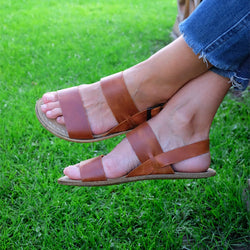
 Shoes
Shoes
 Boots
Boots
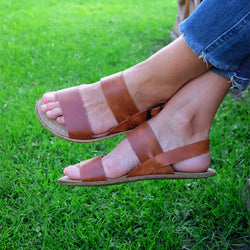 Sandals & Clogs
Sandals & Clogs
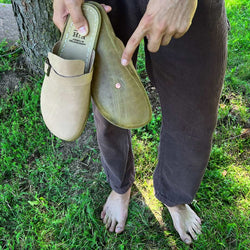
 Shoes
Shoes
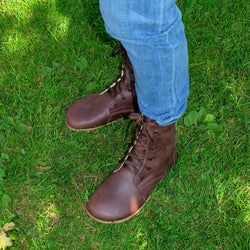 Boots
Boots
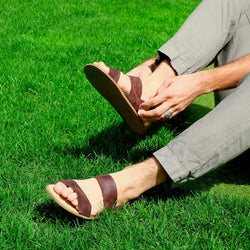 Sandals & Clogs
Sandals & Clogs
